人教版高中英语必修四 unit4 body language 知识点 课件(共30张PPT)
文档属性
| 名称 | 人教版高中英语必修四 unit4 body language 知识点 课件(共30张PPT) |

|
|
| 格式 | ppt | ||
| 文件大小 | 1.0MB | ||
| 资源类型 | 教案 | ||
| 版本资源 | 人教版(新课程标准) | ||
| 科目 | 英语 | ||
| 更新时间 | 2020-09-24 00:00:00 | ||
图片预览

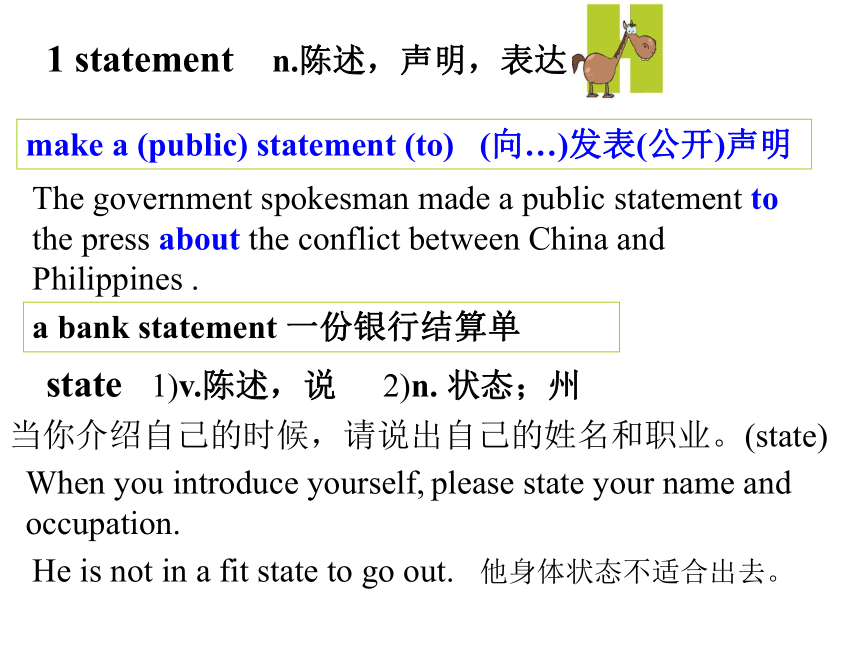
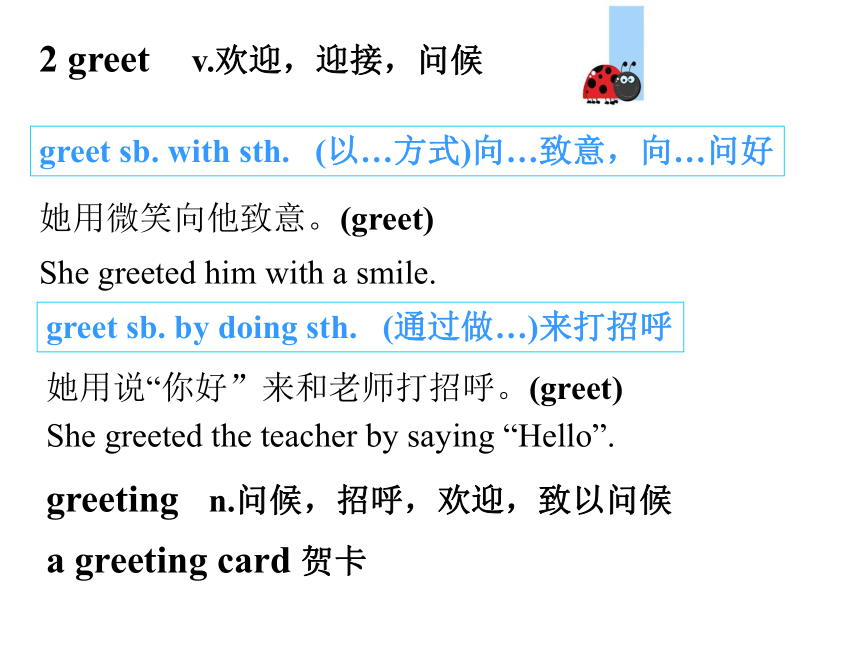
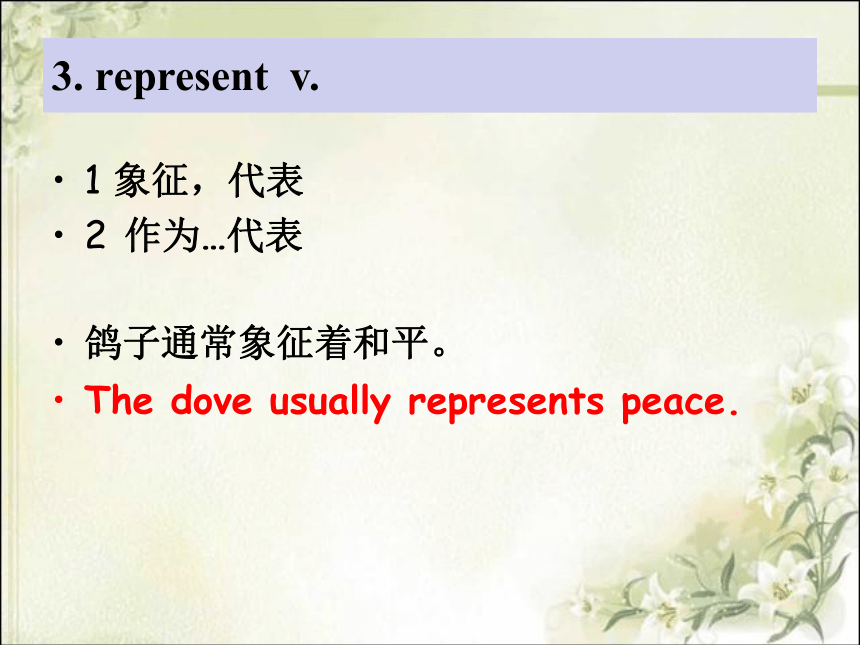
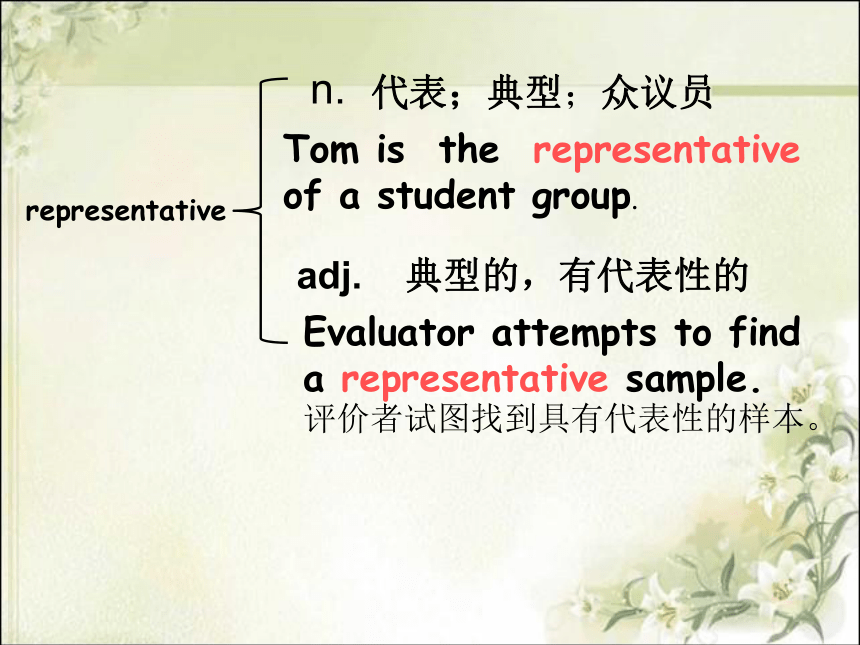
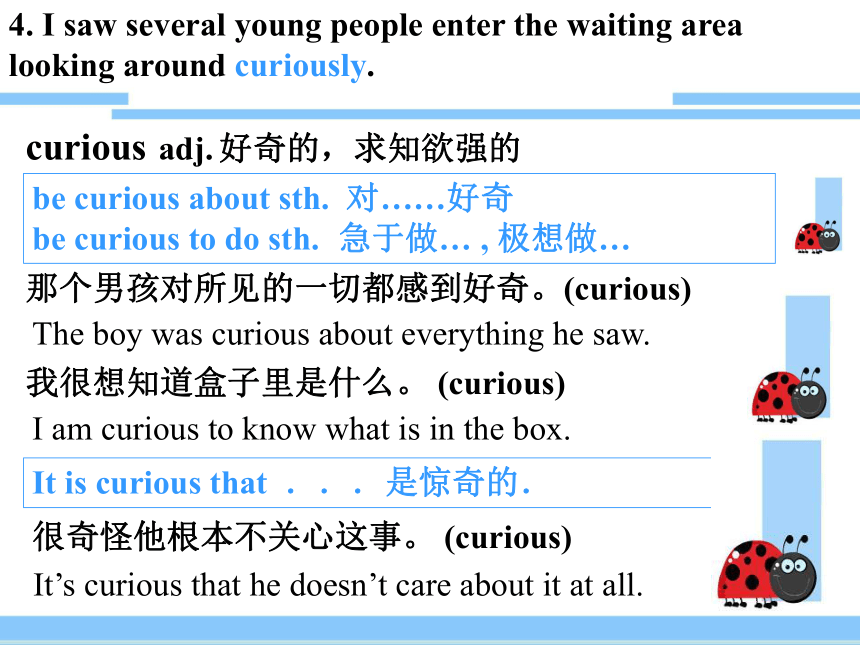




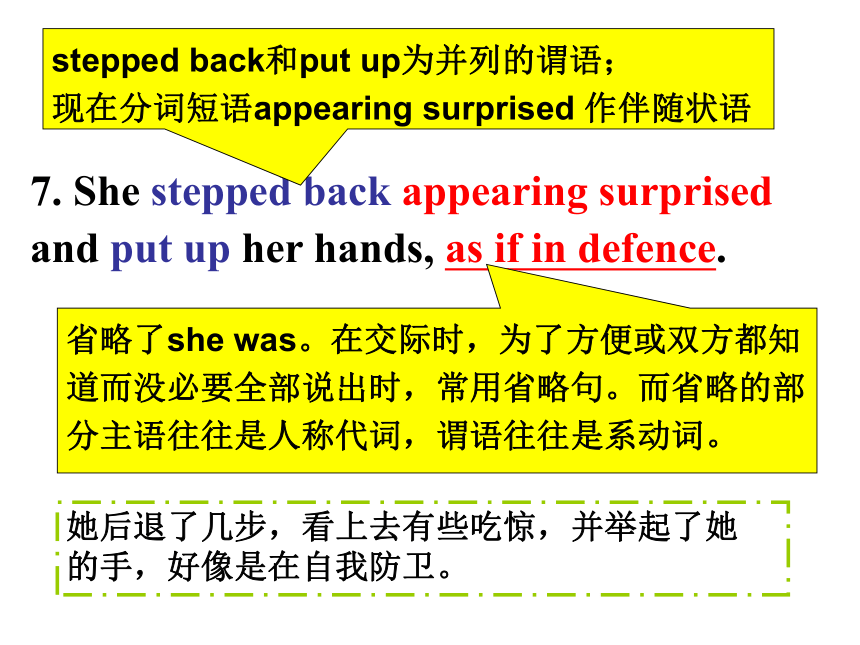
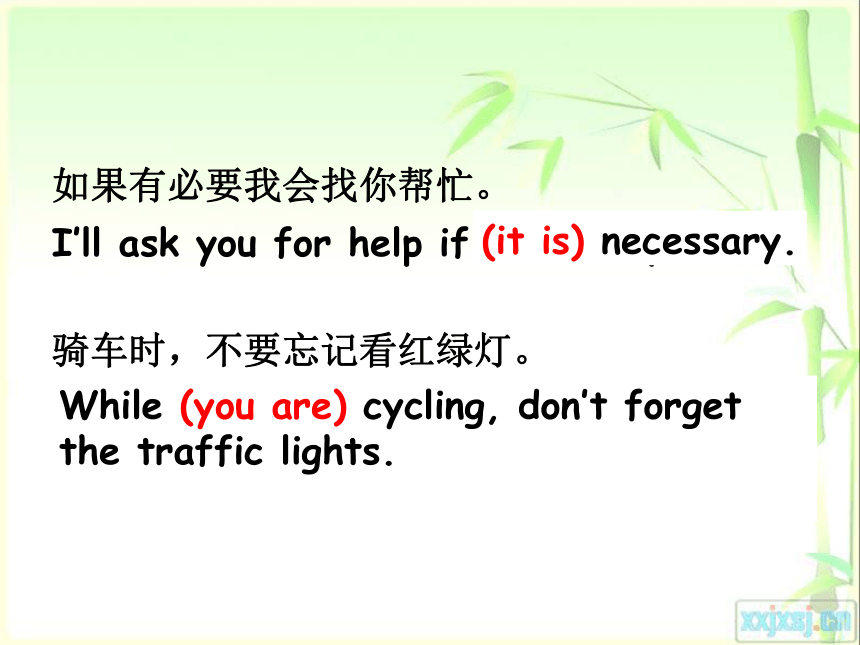
文档简介
Using language
Language Points
1 statement n.陈述,声明,表达
make a (public) statement (to) (向…)发表(公开)声明
The government spokesman made a public statement to the press about the conflict between China and Philippines .
a bank statement 一份银行结算单
state 1)v.陈述,说 2)n. 状态;州
当你介绍自己的时候,请说出自己的姓名和职业。(state)
When you introduce yourself, please state your name and occupation.
He is not in a fit state to go out. 他身体状态不适合出去。
2 greet v.欢迎,迎接,问候
greet sb. with sth. (以…方式)向…致意,向…问好
她用微笑向他致意。(greet)
She greeted him with a smile.
greet sb. by doing sth. (通过做…)来打招呼
She greeted the teacher by saying “Hello”.
她用说“你好”来和老师打招呼。(greet)
greeting n.问候,招呼,欢迎,致以问候
a greeting card 贺卡
3. represent v.
1 象征,代表
2 作为…代表
鸽子通常象征着和平。
The dove usually represents peace.
n.
representative
adj.
典型的,有代表性的
代表;典型;众议员
Tom is the representative of a student group.
Evaluator attempts to find a representative sample.
评价者试图找到具有代表性的样本。
4. I saw several young people enter the waiting area looking around curiously.
curious adj. 好奇的,求知欲强的
be curious about sth. 对……好奇
be curious to do sth. 急于做… , 极想做…
I am curious to know what is in the box.
那个男孩对所见的一切都感到好奇。(curious)
The boy was curious about everything he saw.
我很想知道盒子里是什么。 (curious)
It is curious that ...是惊奇的.
It’s curious that he doesn’t care about it at all.
很奇怪他根本不关心这事。 (curious)
5. The first person to arrive was Tony Garcia from Colombia, closely followed by Julia Smith from Britain.
the first person to arrive “第一个到达的人”
被动关系
The last one ____ pays the meal.
Agreed.
A. arrived B. arrives C. to arrive D. arriving
C
approach 1) vt./vi.接近,走进,靠近
When I approached, they grew silent.
6. Tony approached Julia, touched her shoulder and kissed her on the cheek.
2) n. 接近;方法;路径
approach to …通往……的路径,处理…问题的方法
他处理这个问题的方法是错误的。(approach)
His _________________________ are wrong.
approaches to the problem
通往宫殿的所有道路都有部队把守。(approach)
_____________________________were guarded by troops.
All the approaches to the palace
托尼走近朱莉娅,摸了摸她的肩,并亲了她的脸颊。
verb sb. in/ on/ by the 身体部位=verb sb’s身体部位
kissed her on the cheek.
Tony approached Julia, touched her shoulder and kissed her on the cheek.
?______?apple?fell?from?the?tree?and?hit?
him?on?______?head. (08浙江)
A.?An;?the???? ?B.?The;?the????
?C.?An;?不填??? ??D.?The;?不填
妈妈亲吻了她孩子的脸颊,道了声晚安。
The mother kissed her child on the cheek
and said good night.
7. She stepped back appearing surprised
and put up her hands, as if in defence.
她后退了几步,看上去有些吃惊,并举起了她
的手,好像是在自我防卫。
stepped back和put up为并列的谓语;
现在分词短语appearing surprised 作伴随状语
省略了she was。在交际时,为了方便或双方都知道而没必要全部说出时,常用省略句。而省略的部分主语往往是人称代词,谓语往往是系动词。
如果有必要我会找你帮忙。
I’ll ask you for help if necessary.
骑车时,不要忘记看红绿灯。
While cycling, don’t forget the traffic lights.
(it is) necessary.
While (you are) cycling, don’t forget the traffic lights.
我们的职责是保卫祖国使其不受敌人侵袭。 (defend)
Our duty is ______________________________ the enemies.
她在法庭上成功地为自己作了辩护。(defend)
She __________________________in court.
defended herself successfully
to defend our motherland against
defend
8. I guess that there was probably a major misunderstanding.
major 1) adj. 主要的, (较)大的,重要的
Do you know the major reason for his failing in the exam?
The car needs major repairs.
2) n. 主修科目,专业 vi 主修+in
He planned to take chemistry as his major.
She majored in English at university.
在大学她主修英语。
take… as one’s major 选择以…为专业
你知道他考试失利的主要原因吗?
I guess that there was probably a major misunderstanding.
misunderstanding n. 误解,误会
clear up a misunderstanding 消除误会
have a misunderstanding of 对…产生误解
misunderstand v. 曲解,误会,误解
understand v. 理解
understanding n. 理解
You must have misunderstood my meaning.
He has a clear understanding of the situation.
我讨厌被误解。
I hate being misunderstood.
9. I move back a bit, but he came closer to ask a question and then shook my hand.
close to (时间或空间上)接近,接近(作状语和表语)
亲近的,密切的;(时间、数量)几乎,接近
Don’t stand close to the stove, or it may burn your clothes.
The bank is close to a super market.
银行在一个超市附近。(close)
她一直和父母关系密切。(close)
Para. 4
not all 部分否定=all … not ,not 与一些具有完全意义的词,如all, both, every, everything, everybody, 等连用,不管not 放在什么位置,均表示部分否定。“不尽/全部/完全”;nor “也不尽/全部/完全”。
各种文化背景下的人互相问候的方式不尽相同,身体接触和相互间距的程度也不尽相同。
11. Not all cultures greet each other the same way,
nor are they comfortable in the same way with
touching or distance between people.
nor conj. “也不”,连接否定的并列成分。
I have no brothers, nor any sisters.
Neither my mother nor my father has been to Beijing.(就近)
nor,not, never, neither, hardly, seldom,so等放在句首,即“否定词+助动词/情态动词/be 动词+主语” ,表示前面所述的情况也适用于后者
Nobody can learn body language in one day, __________ (我也不能).
如果你不去看电影,我也不去。neither
If you don’t go to see the movie, _____________.
neither will I
nor can I
(2) I don’t like the book, _____________
(她也不喜欢).
(1) Nobody can learn body language in one day,
_________(我也不能).
nor can I.
nor does she.
(3) I am not a nurse, _________________
(Lily也不是).
nor/neither is Lily
12 likely
However, people from places like Spain, Italy or South American countries approach others closely and are more likely to touch them.
[Fill in the blanks with likely]
1. _____________ (很有可能) that it
will rain.
2. ______________________________
(我们很可能犯错误) when we learn
English.
3. ___________ (我有可能) finish the
work within a week.
It is very likely
We are very likely to make mistakes
I am likely to
用口头语言交流的同时,人们还使用不出声的语言---- 身体间的距离、动作或姿态来表达他们的情感。
using短语作状语, 表方式。
way (方法、方式)作先行词的定语从句。从句中缺状语时用 that/ in which/不填。
13.In the same way that people communicate with
spoken language, they also express their feelings
using unspoken “language” through physical
distance, actions or posture.
1). 普遍的,全面的
Any questions about this general method?
对这个普遍方法还有什么问题?
2). 总的,整体的
in general 大体上, 通常, 总的来讲
e.g. In general, he is a good guy.
14. general adj.
generally speaking 一般而言, 总的来说
e.g. Generally speaking, this may be true.
Generally speaking, we enjoyed the trip.
[Exercise: ]
(1)He has been promoted to ________________.
他已被提升为总经理。
(2)_________________, we enjoyed the trip.
总的来说,我们这次旅行很愉快。
(3)____________ commanded his men to advance.
将军命令他的士兵向前挺进。
(4)____________, her work has been good, but this essay is dreadful. 总的说来,她的作品不错,不过这篇文章糟透了。
general manager
Generally speaking
The general
In general
turn one’s back to 背对;背弃
I have absolute confidence in him, but he shouldn’t turn his back to me.
我绝对信任他,但是他不能背弃我。
和我说话时,不能背对着我。
Don’t turn your back to me while talking to me.
p6 at a distance 离开一些,稍远一些
But sometimes, very formal clothes will keep you at a distance from your colleagues.
但是有时候,非常正式的衣服会让你和同事之间产生距离。
我不知道他为什么和我保持距离。
I don’t know why he kept me at a distance.
p6. rank
He eventually rose to the rank of captain.
他最终升到了船长的职位。
The report ranks the U.S. 20th out of 22 advanced nations.
这份报告把美国排在22个发达国家的第20位。
职位; 级别
给…排名; 名列
Translation:
她不习惯和社会地位很高的人混在一起。
She was not used to mixing with people of high social rank.
这些工作已经按照困难难度分了类。
The tasks have been ranked in order of difficulty.
Language Points
1 statement n.陈述,声明,表达
make a (public) statement (to) (向…)发表(公开)声明
The government spokesman made a public statement to the press about the conflict between China and Philippines .
a bank statement 一份银行结算单
state 1)v.陈述,说 2)n. 状态;州
当你介绍自己的时候,请说出自己的姓名和职业。(state)
When you introduce yourself, please state your name and occupation.
He is not in a fit state to go out. 他身体状态不适合出去。
2 greet v.欢迎,迎接,问候
greet sb. with sth. (以…方式)向…致意,向…问好
她用微笑向他致意。(greet)
She greeted him with a smile.
greet sb. by doing sth. (通过做…)来打招呼
She greeted the teacher by saying “Hello”.
她用说“你好”来和老师打招呼。(greet)
greeting n.问候,招呼,欢迎,致以问候
a greeting card 贺卡
3. represent v.
1 象征,代表
2 作为…代表
鸽子通常象征着和平。
The dove usually represents peace.
n.
representative
adj.
典型的,有代表性的
代表;典型;众议员
Tom is the representative of a student group.
Evaluator attempts to find a representative sample.
评价者试图找到具有代表性的样本。
4. I saw several young people enter the waiting area looking around curiously.
curious adj. 好奇的,求知欲强的
be curious about sth. 对……好奇
be curious to do sth. 急于做… , 极想做…
I am curious to know what is in the box.
那个男孩对所见的一切都感到好奇。(curious)
The boy was curious about everything he saw.
我很想知道盒子里是什么。 (curious)
It is curious that ...是惊奇的.
It’s curious that he doesn’t care about it at all.
很奇怪他根本不关心这事。 (curious)
5. The first person to arrive was Tony Garcia from Colombia, closely followed by Julia Smith from Britain.
the first person to arrive “第一个到达的人”
被动关系
The last one ____ pays the meal.
Agreed.
A. arrived B. arrives C. to arrive D. arriving
C
approach 1) vt./vi.接近,走进,靠近
When I approached, they grew silent.
6. Tony approached Julia, touched her shoulder and kissed her on the cheek.
2) n. 接近;方法;路径
approach to …通往……的路径,处理…问题的方法
他处理这个问题的方法是错误的。(approach)
His _________________________ are wrong.
approaches to the problem
通往宫殿的所有道路都有部队把守。(approach)
_____________________________were guarded by troops.
All the approaches to the palace
托尼走近朱莉娅,摸了摸她的肩,并亲了她的脸颊。
verb sb. in/ on/ by the 身体部位=verb sb’s身体部位
kissed her on the cheek.
Tony approached Julia, touched her shoulder and kissed her on the cheek.
?______?apple?fell?from?the?tree?and?hit?
him?on?______?head. (08浙江)
A.?An;?the???? ?B.?The;?the????
?C.?An;?不填??? ??D.?The;?不填
妈妈亲吻了她孩子的脸颊,道了声晚安。
The mother kissed her child on the cheek
and said good night.
7. She stepped back appearing surprised
and put up her hands, as if in defence.
她后退了几步,看上去有些吃惊,并举起了她
的手,好像是在自我防卫。
stepped back和put up为并列的谓语;
现在分词短语appearing surprised 作伴随状语
省略了she was。在交际时,为了方便或双方都知道而没必要全部说出时,常用省略句。而省略的部分主语往往是人称代词,谓语往往是系动词。
如果有必要我会找你帮忙。
I’ll ask you for help if necessary.
骑车时,不要忘记看红绿灯。
While cycling, don’t forget the traffic lights.
(it is) necessary.
While (you are) cycling, don’t forget the traffic lights.
我们的职责是保卫祖国使其不受敌人侵袭。 (defend)
Our duty is ______________________________ the enemies.
她在法庭上成功地为自己作了辩护。(defend)
She __________________________in court.
defended herself successfully
to defend our motherland against
defend
8. I guess that there was probably a major misunderstanding.
major 1) adj. 主要的, (较)大的,重要的
Do you know the major reason for his failing in the exam?
The car needs major repairs.
2) n. 主修科目,专业 vi 主修+in
He planned to take chemistry as his major.
She majored in English at university.
在大学她主修英语。
take… as one’s major 选择以…为专业
你知道他考试失利的主要原因吗?
I guess that there was probably a major misunderstanding.
misunderstanding n. 误解,误会
clear up a misunderstanding 消除误会
have a misunderstanding of 对…产生误解
misunderstand v. 曲解,误会,误解
understand v. 理解
understanding n. 理解
You must have misunderstood my meaning.
He has a clear understanding of the situation.
我讨厌被误解。
I hate being misunderstood.
9. I move back a bit, but he came closer to ask a question and then shook my hand.
close to (时间或空间上)接近,接近(作状语和表语)
亲近的,密切的;(时间、数量)几乎,接近
Don’t stand close to the stove, or it may burn your clothes.
The bank is close to a super market.
银行在一个超市附近。(close)
她一直和父母关系密切。(close)
Para. 4
not all 部分否定=all … not ,not 与一些具有完全意义的词,如all, both, every, everything, everybody, 等连用,不管not 放在什么位置,均表示部分否定。“不尽/全部/完全”;nor “也不尽/全部/完全”。
各种文化背景下的人互相问候的方式不尽相同,身体接触和相互间距的程度也不尽相同。
11. Not all cultures greet each other the same way,
nor are they comfortable in the same way with
touching or distance between people.
nor conj. “也不”,连接否定的并列成分。
I have no brothers, nor any sisters.
Neither my mother nor my father has been to Beijing.(就近)
nor,not, never, neither, hardly, seldom,so等放在句首,即“否定词+助动词/情态动词/be 动词+主语” ,表示前面所述的情况也适用于后者
Nobody can learn body language in one day, __________ (我也不能).
如果你不去看电影,我也不去。neither
If you don’t go to see the movie, _____________.
neither will I
nor can I
(2) I don’t like the book, _____________
(她也不喜欢).
(1) Nobody can learn body language in one day,
_________(我也不能).
nor can I.
nor does she.
(3) I am not a nurse, _________________
(Lily也不是).
nor/neither is Lily
12 likely
However, people from places like Spain, Italy or South American countries approach others closely and are more likely to touch them.
[Fill in the blanks with likely]
1. _____________ (很有可能) that it
will rain.
2. ______________________________
(我们很可能犯错误) when we learn
English.
3. ___________ (我有可能) finish the
work within a week.
It is very likely
We are very likely to make mistakes
I am likely to
用口头语言交流的同时,人们还使用不出声的语言---- 身体间的距离、动作或姿态来表达他们的情感。
using短语作状语, 表方式。
way (方法、方式)作先行词的定语从句。从句中缺状语时用 that/ in which/不填。
13.In the same way that people communicate with
spoken language, they also express their feelings
using unspoken “language” through physical
distance, actions or posture.
1). 普遍的,全面的
Any questions about this general method?
对这个普遍方法还有什么问题?
2). 总的,整体的
in general 大体上, 通常, 总的来讲
e.g. In general, he is a good guy.
14. general adj.
generally speaking 一般而言, 总的来说
e.g. Generally speaking, this may be true.
Generally speaking, we enjoyed the trip.
[Exercise: ]
(1)He has been promoted to ________________.
他已被提升为总经理。
(2)_________________, we enjoyed the trip.
总的来说,我们这次旅行很愉快。
(3)____________ commanded his men to advance.
将军命令他的士兵向前挺进。
(4)____________, her work has been good, but this essay is dreadful. 总的说来,她的作品不错,不过这篇文章糟透了。
general manager
Generally speaking
The general
In general
turn one’s back to 背对;背弃
I have absolute confidence in him, but he shouldn’t turn his back to me.
我绝对信任他,但是他不能背弃我。
和我说话时,不能背对着我。
Don’t turn your back to me while talking to me.
p6 at a distance 离开一些,稍远一些
But sometimes, very formal clothes will keep you at a distance from your colleagues.
但是有时候,非常正式的衣服会让你和同事之间产生距离。
我不知道他为什么和我保持距离。
I don’t know why he kept me at a distance.
p6. rank
He eventually rose to the rank of captain.
他最终升到了船长的职位。
The report ranks the U.S. 20th out of 22 advanced nations.
这份报告把美国排在22个发达国家的第20位。
职位; 级别
给…排名; 名列
Translation:
她不习惯和社会地位很高的人混在一起。
She was not used to mixing with people of high social rank.
这些工作已经按照困难难度分了类。
The tasks have been ranked in order of difficulty.
同课章节目录
